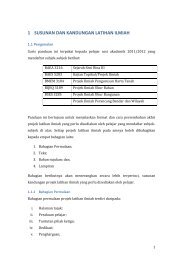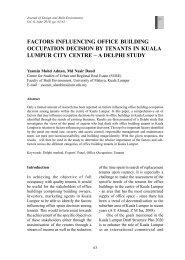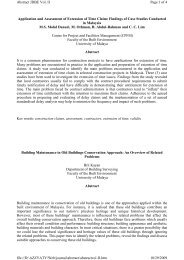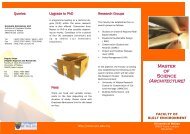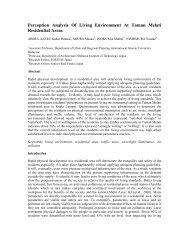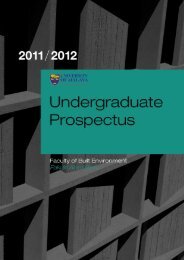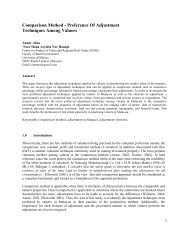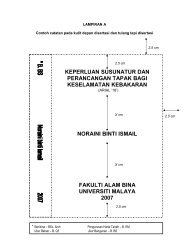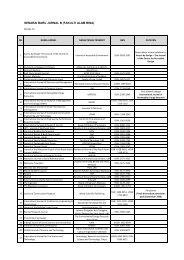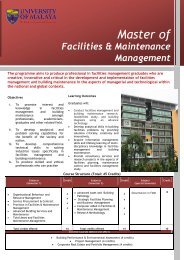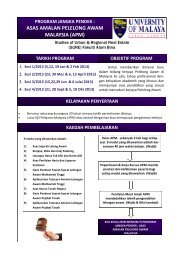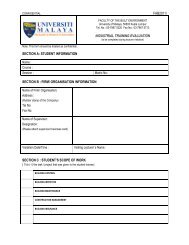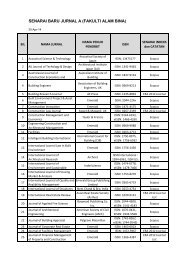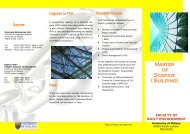Bachelor of Quantity Surveying - Faculty of Built Environment
Bachelor of Quantity Surveying - Faculty of Built Environment
Bachelor of Quantity Surveying - Faculty of Built Environment
Create successful ePaper yourself
Turn your PDF publications into a flip-book with our unique Google optimized e-Paper software.
<strong>Faculty</strong> <strong>of</strong> <strong>Built</strong> <strong>Environment</strong> > Undergraduate Prospectus > 3<br />
QUANTITY SURVEYING<br />
Introduction<br />
The course was initiated in 1995. In July 1996, the first batch <strong>of</strong> students enrolled for their studies in <strong>Bachelor</strong> <strong>of</strong><br />
<strong>Quantity</strong> <strong>Surveying</strong> under a new program called <strong>Built</strong> <strong>Environment</strong> Program which was subsequently upgraded<br />
to <strong>Built</strong> <strong>Environment</strong> Division under the umbrella <strong>of</strong> the <strong>Faculty</strong> <strong>of</strong> Engineering. Later, the Division was upgraded<br />
into a full-fledged faculty known as the <strong>Faculty</strong> <strong>of</strong> the <strong>Built</strong> <strong>Environment</strong> in May 2000.<br />
Programme Goal(s)<br />
To produce graduates with a pr<strong>of</strong>essional degree in <strong>Quantity</strong> <strong>Surveying</strong> to practice within but not limited to the<br />
construction industry both local and international who can understand and apply knowledge effectively with<br />
high awareness <strong>of</strong> culture and ethics.<br />
Programme Learning Outcomes<br />
At the end <strong>of</strong> the programme, graduates are able to:<br />
• Define and describe the relevant knowledge in the area <strong>of</strong> quantity surveying.<br />
• Demonstrate the necessary technical and practical skills in the quantity surveying field.<br />
• Carry out pr<strong>of</strong>essional responsibilities towards all relevant stakeholders in the industry.<br />
• Demonstrate the required level <strong>of</strong> pr<strong>of</strong>essionalism and commitment to ethical practice.<br />
• Demonstrate the ability to give views that are pr<strong>of</strong>icient, logical and pr<strong>of</strong>essionally sound in all forms<br />
<strong>of</strong> communication and the ability to work independently and collaboratively as a team leader.<br />
• Identify and analyse problems, evaluate strategic choices, able to arrive at a decision with<br />
supporting evidence and give good judgement.<br />
• Express the ability and interest in accumulating knowledge to enhance self-development.<br />
• Develop effective and efficient managerial and entrepreneurial skills.<br />
Programme Structure<br />
The structure <strong>of</strong> the <strong>Quantity</strong> <strong>Surveying</strong> Program in University <strong>of</strong> Malaya has been formulated with the<br />
assistance from the Institution <strong>of</strong> Surveyors Malaysia (ISM) and designed in accordance with the general<br />
guidelines provided by the Board <strong>of</strong> <strong>Quantity</strong> Surveyors Malaysia (BQSM) and the Royal Institution <strong>of</strong><br />
Chartered Surveyors (RICS), United Kingdom and has received accreditations from BQSM and RICS<br />
respectively.<br />
The course structure consists <strong>of</strong> four (4) years full time studies and divided into two (2) durations <strong>of</strong> studies per<br />
year (Semester I and Semester II). Upon graduation and having worked for two (2) years under the supervision<br />
<strong>of</strong> a Registered <strong>Quantity</strong> Surveyor, students are eligible to sit for the examination <strong>of</strong> the Test <strong>of</strong> Pr<strong>of</strong>essional<br />
Competence in order to obtain the recognition as a Registered <strong>Quantity</strong> Surveyor from the BQSM.<br />
Examination and Assessment<br />
In line with Semester System principles, examinations are conducted twice a year that is at the end <strong>of</strong> each<br />
semester. Generally, the final exam marks is not less than 60% <strong>of</strong> the total marks, while assessment based<br />
on coursework is not more than 40% <strong>of</strong> the overall marks. However, for certain subjects, for example<br />
Integrated Projects 1-3, Practical Training and Final Year Academic Project the assessment are solely based<br />
on the coursework and continuous assessment



